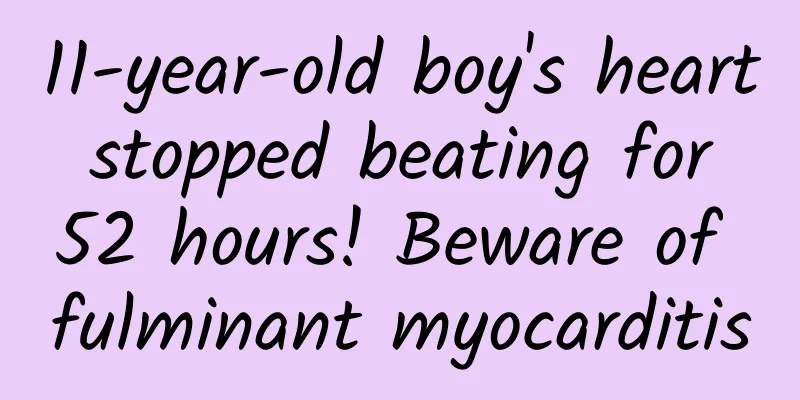11-year-old boy's heart stopped beating for 52 hours! Beware of fulminant myocarditis

|
Recently, an 11-year-old boy in Guangdong suffered repeated convulsions and severe heart rate disorders after a fever and was rushed to the hospital. During the rescue process, the boy's heart stopped beating for 52 hours. After a week of life support treatment and 37 days of full treatment, the child's physical indicators gradually recovered. Experts diagnosed it as fulminant myocarditis, a severe form of viral myocarditis. This incident once again shows that fulminant myocarditis is a disease with an insidious onset, rapid progression and a very high mortality rate. Beware of the threat hidden behind colds The initial symptoms of fulminant myocarditis are similar to those of the common cold, mostly manifested as symptoms of upper respiratory tract infection or intestinal infection. Patients may experience common symptoms such as cough, runny nose, sore throat, fever, diarrhea, etc. However, 7 to 10 days after the onset of the disease, patients may experience symptoms of heart discomfort such as chest tightness, palpitations, extreme fatigue, and easy sweating. If you experience these symptoms after a cold, you should be highly vigilant and go to the hospital for examination in time: feeling of oppression in the chest, difficulty breathing accompanied by abnormally accelerated, strengthened or irregular heartbeat, extreme fatigue that makes the patient feel weak all over, difficulty in performing simple activities, easy sweating, etc. According to clinical data, more than 50% of patients with viral myocarditis have a history of colds. Viral myocarditis is usually caused by viral infections, including influenza virus and adenovirus. After the human body is infected with these viruses, the viruses may directly invade myocardial cells and multiply in large numbers in them, destroying the structure and function of myocardial cells; they may also trigger the body's immune response, and the immune system may accidentally injure myocardial cells when attacking the virus, aggravating myocardial inflammation. In addition, bad living habits and factors may increase the risk of fulminant myocarditis. Overwork, staying up late for a long time, excessive mental stress, malnutrition, etc. will weaken the body's immunity and make the body more susceptible to virus attack. People with underlying diseases, such as heart disease patients, diabetics, and people with low immunity, are at a higher risk of disease. How is fulminant myocarditis treated? 1. Treatment of fulminant myocarditis The key is timely diagnosis and active treatment. Once myocarditis is suspected, the patient should be sent to the hospital for professional treatment immediately. 2. The hospital will take a series of treatment measures according to the specific situation of the patient: Life support treatment includes respiratory support, circulatory support, etc. For patients with cardiac arrest or severe arrhythmia, heart assist devices such as extracorporeal membrane oxygenation (ECMO) may be needed to maintain heart and lung function. 3. Antiviral treatment: Doctors will select appropriate antiviral drugs based on the type of virus to inhibit viral replication and spread and reduce myocardial inflammatory response. 4. Immunomodulatory therapy: Immunomodulatory therapy can reduce the damage of the immune system to myocardial cells. For example, the use of immunosuppressants such as glucocorticoids can inhibit excessive immune responses and protect myocardial cells. How to prevent fulminant myocarditis by improving lifestyle habits? 1. Regular exercise: Regular exercise can enhance physical fitness, improve human immunity, and enhance cardiopulmonary function. You can choose a suitable exercise method, such as running, swimming, yoga, etc., and exercise a certain number of times a week. 2. Maintain good eating habits: eat more fresh vegetables and fruits, whole grains, lean meat, fish and other foods, and reduce the intake of high-calorie, high-fat and high-sugar foods. 3. Regular flu vaccination and physical examination: For high-risk groups, such as those with weakened immune systems, flu vaccination and regular physical examinations are very important. Flu vaccination can effectively prevent influenza virus infection and reduce the risk of viral myocarditis. Regular physical examinations can detect potential health problems in a timely manner, so that early detection and early treatment can be achieved. In conclusion, fulminant myocarditis is a serious disease that is often neglected. Understanding its symptoms, causes, treatments, and prevention methods can help you better protect yourself from this potentially fatal risk. At the same time, timely medical treatment and maintaining good living habits are the key to preventing and controlling fulminant myocarditis. |
<<: In the search for extraterrestrial life, why do scientists use Earth life as a reference?
Recommend
Zhu Dan's Basic Sketching Course [General Quality]
Table of contents: 02 How to draw the folds of cl...
Tips for creating landing pages for advertising!
This article will share with you the techniques f...
Online earning sideline project, you will get income if you browse, you can do it all over the world
Online earning sideline project, there is income ...
E-commerce operations: coupon product analysis
On e-commerce platforms, issuing coupons is a ver...
Without high technology, how did the ancients keep national security secret?
Throughout the vast course of history, the confid...
"Practical Course on Creating Accounts for Live Streaming on Douyin for Physical Stores" has five core sections from zero cognition to actual practice
Training course video content introduction: The f...
Do you have bad breath when you play with your phone? I put my phone down silently after reading this...
Rotten apples, rotten eggs, blood... Having bad b...
How does weather affect air quality? A guide for residents to protect themselves from air pollution in autumn and winter →
As the autumn breeze brings coolness and winter a...
Don’t worry if you lose your phone! Apple Pay explained
After nearly two years of release and various twis...
It can grow a new head even if it's missing! Why is the "Axolotl" so amazing?
If you love to visit flower and bird markets, you...
What? This animal can actually understand "stop at red lights and go at green lights"?
In our cities, there are actually many wild anima...
The deepest well in the world is 12,262 meters deep.
On Russia's Kola Peninsula, in the wilderness...
China's "compound eyes": tracking "uninvited guests" in space
If an asteroid hits the Earth one day, is it poss...
Food prices rose 21.9% in February! Why are food prices rising? The National Bureau of Statistics explains the reason!
February is a critical period for epidemic preven...
I squeezed a pimple and almost sent myself to the ICU! @Everyone: Fight against acne with your wits
Many people have experienced "battle acne&qu...









